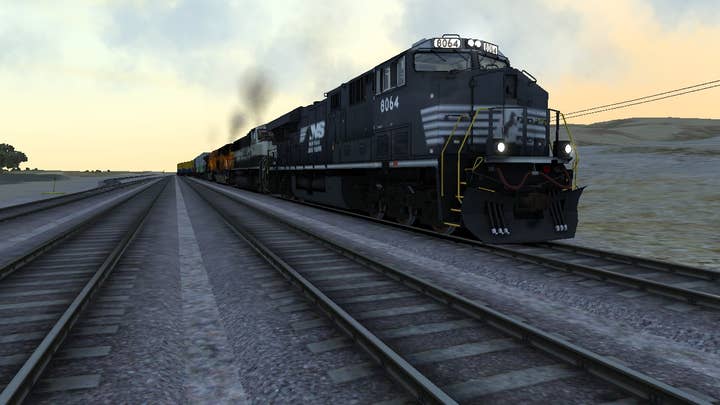Calling at Every Platform
Dovetail's Jon Rissik on planes, trains and fly fishing reels
I'm guessing that this happens to people of all nationalities, but there are certain phenomena which I always assume, usually incorrectly, are entirely domestic - so fundamentally British that they must have originated here and failed to migrate. Morris dancing is probably the yardstick, although cheese rolling and shin kicking competitions come close. Trainspotting (the activity, not the book/film) is one of the others.
However, Railfans are far from restrained to the sidings and platforms of Great Britain - in fact, they're global, and they're big business. Like any group of people dedicated to a quietly widespread but somewhat pilloried hobby, they're also keen to find new ways to indulge their obsessions.
For Dovetail, publisher of Train Siumlator, that's proven something of a boon. Previously RailSimulator.com, the company has built itself on the locomotive dreams of a core audience of dedicated fans who want nothing more than to live out childhood dreams of pootling between Stoke and Bristol in the cab of a train. A year ago, the company rebranded itself to Dovetail, expanding its offering to new hobbyist pursuits by taking on Microsoft's FSX Flight Simulator for a Steam conversion and preparing Dovetail Fishing - a VR focused angling game. Everything since has been growth.
"We've come from a one product business to a three product business within a very short space of time - that has its organizational challenges"
"We're up to 98 at the moment and still growing," Dovetail's MD, Jon Rissik, tells me. "We're currently looking for folks in a number of development roles, more technical roles. It's been a fast growth. We changed the name over a year or so ago in preparation for becoming a multi-franchise business. Clearly we couldn't remain as Railsimulator.com once we had products that weren't in the rail space.
"We knew that these things were coming, we wanted to get ahead of it. We wanted to have a more general name so we made that change. We brought Dovetail Games Fishing into Early Access in the autumn of last year and then we concluded our deal with Microsoft around the middle of the year, bringing FSX to Steam just prior to Christmas. We are also looking to use Microsoft technology to create our own flight simulator over time but we're at the early stages of that.
"There's more growth and expansion hopefully to come for us. It's been exciting, it's been challenging. We've come from a one product business to a three product business within a very short space of time - that has its organizational challenges. But it's exciting and I think everyone here is seeing the rewards of that. We have three products doing well in the market and we look to grow from that."

Dovetail's audience is dedicated, cash-rich and underserved. By providing huge amounts of choice, well presented and tightly targeted to that audience's needs, Dovetail has secured the loyalty of a tremendously specific but well-monetising market. Key to that has been the regular publishing of DLC packs - generally specific lines or engines for Train Simulator. By breaking down these purchases as much as possible, Dovetail has generated highly enviable ARPU, but this wasn't always the plan.
"We've been able to create a really interesting space within the trains business by delivering content to market in a way that actually, we really didn't think of when we started the company. We were looking at far more of a traditional method of releasing content, whereby we would have an annual box release and potentially a digital release and then we would release probably quarterly expansion packs for that product.
"we do serve a niche market and we're very proud of that. We don't sell many, many millions of units but that's okay, we don't need to"
"It wasn't until we really investigated what Steam could deliver for us that we thought 'Actually, there's much more we could do with this,' and that DLC would play a much bigger part in our story. And that's when we really started to see that when we release DLC, we would not only see that DLC selling but we would see the sales in our core products take a boost as well. The more content we have, the more we saw all boats rise and our sales lift. And that's something we've looked to continue to deliver.
"I think it is about finding that right place in the market, and we do serve a niche market and we're very proud of that. We don't sell many, many millions of units but that's okay, we don't need to. And I think if we were to try to broaden our base too far, we'd probably lose what our core fans like about the product anyway. That's not a path we want to go down. We don't think of ourselves as producing video games as much as servicing a digital hobby.
"I have lots of hobbies. I'm a runner. I know I probably spend more time reading running magazines or on forums or looking at equipment than I ever do running. It's the things you do when you're not being engaged in that actual hobby that make hobbies fun. So we've really tried to tap into that and as a result we've had some people that have been with us from day one, but a lot of customers have been with us three or four years now and hopefully, are having as much pleasure with the hobby as they did the day when they first were introduced to it."

Whilst it might be an extremely successful strategy, reception to the DLC-centric approach from fans isn't always so favourable. Like audiences anywhere, they're suspicious of any new marketing or sales technique and it's often the most dedicated who are the quickest to make accusations of exploitation. In fact, Train Simulator's Steam page has suffered a rash of negative reviews from long-term fans of late, unhappy about what they perceive to be an over-abundance of paid-for extras.
"You go off the Steam home page for Train Simulator and you will see the Buy All button," sighs Rissik. "It will tell you that if you buy all of our content, it's an astronomical amount, and it's often quoted by press. [It's £2,806.87.] But we genuinely never ask or expect our customers to buy everything that's in that shop - in the same way that if I go into a grocery store, my local grocery store are not telling me to buy everything that they're retailing.
"We retail a lot of content. You can mix and match and pick and choose and do as you will. And we know the customers do because within rail fandom it's quite segregated. You have people whose interest specializes by rail network, for example, or by country or by the sort of engine. Is it a diesel engine, is it a steam engine, is it an electric engine? And that you won't have very much interest in something that sits outside of that particular passion. It's like music. If you're into rock music, you may not be into jazz or classical and you probably filter jazz and classical out of your life. It doesn't mean you're not a music man. It's the same way with rail fans and so we try to make sure that there's enough content to service each of those sub groups if you will. We never expect everyone to buy everything. I would be horrified actually if anyone did buy everything. That would not be a good use of people's money."
"We never expect everyone to buy everything. I would be horrified actually if anyone did buy everything. That would not be a good use of people's money"
There's a number of fairly hackneyed stereotypes associated with the hobbies that Dovetail are covering. The natural inclination is to assume that they're largely male, middle-aged and, frankly, looking for a bit of peace and quiet. I ask Rissik if the company is cultivating a particular audience, or if the crossover has been accidental.
"We certainly choose our products very carefully," he tells me. "There is no point in us trying to produce a football simulator for example. As someone who's worked for a number of years in or around the FIFA franchise when I was at EA, I know how powerful that is. And clearly, that would be unwise. So we try to choose areas that we think are under-served. We try to chose hobbies and disciplines that we think we can add some value to and that will fit against our development principals, what we're trying to achieve.
"We're not here to produce fire-and-forget products. We want to produce products that people will enjoy over an extended period and therefore, the hobbies themselves need to be extendible. And again, I think fishing is the perfect example of that. You may be a fly fisherman and you may have never fished for bass or carp. Fine, you're still a fisherman. And again if you're a fly fisherman, you want a very deep simulation into that thing that is your passion and you're not interested in another discipline. And again, it's a very broad hobby that allows us to really specialize in very specific areas and go deep on those."

Speaking of people who enjoy a bit of isolation, and a particular personal hankering for a truly immersive fishing sim, my thoughts turn to VR. With the proliferation of HMDs about to sweep across the consumer market, virtual reality looks like a hugely apposite market for Dovetail to turn to.
"We're excited about it," Rissik confirms. "We have been for some time, we've been talking to a bunch of parties over the past 12 months about their plans for VR. It clearly sits very well with the sort of entertainment that we deliver where you are driving a train, flying a plane, fishing by a river bank - relatively slow-paced activities, but deeply immersive and authentic. I think VR can really deliver against that.
"Whether it ever fully replaces a keyboard or mouse or controller remains to be seen, but we very much want to be in at that first wave. It's an opportunity for us. More on that to come over the course of the year, but yeah, very excited about it."
It's more than just a vague plan, too. Dovetail was named as one of the official partners of Valve and HTC's VR collaboration, the Vive, and Oculus support is also expected. In addition to VR, Rissik says that Dovetail is also targeting a much less obvious, but far more established market: living room consoles. But is there really the same audience in that space?
"we've been talking to a bunch of parties over the past 12 months about their plans for VR. It clearly sits very well with the sort of entertainment that we deliver"
"I think the living room is a natural extension for us," says Rissik, confidently. "Which obviously calls to mind certain products that can deliver software to the living room.
"We already make our games compatible for the Xbox controller which gives us a great advantage, so it's not as if we're trying to map a whole suite of very complex commands to the controller, we're already doing that with Train Simulator. That's something we would look to expand upon as we move forward. So I don't think we need to change the experience dramatically, actually. It would be about presenting in the right way for those customers. Where we're looking at fishing, we try to minimize the amount of information that the player has on the screen. We're not bombarding people with menus. We're trying not to make things overly complicated - that's one of the keys with simulation, I think that's where simulation can really become toonish: when it tries to replicate everything.
"How do I deliver an experience in a way that is compelling, that makes me feel as if I'm behind the cockpit of a commercial plane, but I'm not having to go through a year of training or read a 300-page manual? That's challenging. And that's the balance these products have to have. I think we do that pretty well with Trains using our hub system. I think that gets around some of those issues. We just need to find that sweet spot for our other franchises."

